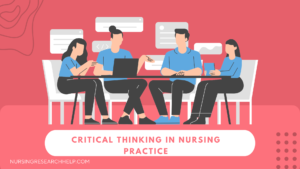Importance of Critical Thinking in Nursing Practice

Importance of Critical Thinking in Nursing Practice
Having a good understanding of critical thinking is an important part of the nursing profession. It’s a skill that can be learned and developed in many ways. This article outlines some of the basics of critical thinking and discusses how to develop it. It also provides importance of critical thinking in nursing practice, and examples of how critical thinking can be applied in nursing practice.
Importance of Critical Thinking in Nursing Practice
Basics of critical thinking
Developing a strong understanding of the basics of critical thinking in nursing practice will increase your confidence in addressing clinical problems. This will help you make better decisions for your patients and improve their outcomes.
Nurses need to be creative in tackling clinical problems. To do this, they need to analyze information, identify and prioritize clinical issues, and formulate solutions. By doing so, they can show that they are independent thinkers.
In addition, nurses must develop inductive and deductive reasoning skills. Using these skills, they can determine which claims are based on facts and which are based on judgments. They must also check the validity of the information they have gathered.
As a nurse, you should understand the emotions that are associated with critical thinking. If you feel anger, frustration, or guilt, you should ponder your feelings and determine whether you need to act or if you need to discuss them with a trusted person.
Aside from being a good decision-maker, a good critical thinker must remain impartial. This means they should be open to various intervention methods and accept that personal biases may affect their judgment. They should also develop independence of thought, develop self-confidence, and become independent of their beliefs.
The development of these skills is facilitated by observing clinical dynamics. In this process, nurses observe the clinical situation, ask questions, and analyze the clinical information. They also consider the consequences of their actions. In some situations, they must quickly formulate a new plan.
As a result, they can make accurate conclusions. It is important to keep in mind that many decisions are based on habit. It is therefore necessary to reflect on these decisions to determine whether they are reliable.
A good critical thinker will be able to evaluate the advantages and disadvantages of the different alternatives. They will be able to recognize and avoid inconsistencies, and be able to find syllogistic errors.
Aside from improving their critical thinking skills, nurses should make efforts to collaborate with their colleagues to implement critical thinking in their nursing practices. Collaboration involves creating a multidisciplinary joint care plan. It also emphasizes evidence-based care. This helps to create a favorable environment for critical thinking.
Importance of Critical Thinking in Nursing Practice
Key elements of critical thinking
Whether you are new to the profession or an experienced nurse, critical thinking skills are important to provide the best possible patient care. Without them, you could make a mistake that could put the patient at risk.
For example, if a patient’s blood pressure is falling below an acceptable level, you should contact a physician immediately. If you are the only person on the team, you may not have a clear picture of what needs to be done. A critical thinking nurse, on the other hand, has access to all the necessary information to formulate an appropriate intervention for the patient.
Critical thinking is an active process that requires an individual’s commitment to a decision. It is a skill that can be developed over time. It is a discipline that requires a strong sense of focus, curiosity, and persistence. Keeping a journal or a diary can help you map out the main concepts and their key points.
The basic concept of critical thinking is the ability to recognize a situation and identify the most important thing to do in that situation. It involves analyzing a patient’s condition, asking questions, and determining the most effective way to respond. It also entails recognizing a hypothesized solution to a problem.
The most effective way to do this is to look at the problem from a variety of perspectives. This includes considering the viewpoints of others. It is also helpful to consider multiple treatment options. A skilled practitioner will keep these ideas in mind as they work with a patient.
The most important part of critical thinking is evaluating the data collected. This can be a difficult task, especially when you are a nursing student. However, you can learn to do it by experimenting with simulations. A well-executed simulation can teach you the tenets of critical thinking.
Another important aspect of critical thinking in nursing is the ability to share and implement knowledge. In this way, you are able to anticipate changes in a patient’s condition. This can lead to improved patient care and professional development.
Importance of Critical Thinking in Nursing Practice
Methods to develop critical thinking skills
Developing critical thinking skills in nursing practice is a process that involves asking questions, evaluating information, and making conclusions. These skills are used to improve patient outcomes and ensure evidence-based decision-making.
Critical thinking skills in nursing are acquired through experience, commitment, and analysis of a wide variety of information. These skills help nurses recognize and anticipate changes in a patient’s health condition. They also allow nurses to make the best possible decisions.
The first step to develop critical thinking skills in nursing is to dispassionately consider facts. You need to be able to identify the problem, determine the best course of action, and then select the solution that is most appropriate.
There are several ways to develop your skills, including reading medical journals, attending conferences, and speaking with peers and mentors. These strategies will help you keep your skills ahead of the curve.
One of the best ways to exercise your critical thinking skills is to use brainstorming. This process can be applied in a hospital scenario or during a situational crisis. You can also ask questions to clarify your understanding of a situation.
Another way to improve your critical thinking skills is to surround yourself with experienced nurses. You can also ask your mentors for tips on patient care and their recommendations on the best ways to develop your skills.
The most important element of critical thinking in nursing is to have the right skills to handle the challenges that you will face in your career. These skills will enable you to make the best possible decisions for the patient. If you are not able to do this, you could end up making a decision that puts your patient at risk.
Critical thinking skills in nursing require a good grasp of medical procedures and a firm understanding of the scope of your practice. These skills will help you with everyday tasks, such as evaluating and gathering patient data, and determining which data points are important to your patient’s care. Using these skills will help you evaluate the patient, decide on an intervention, and ensure the patient’s health.
Importance of Critical Thinking in Nursing Practice
Examples of critical thinking in nursing practice
Using critical thinking in nursing practice can improve patient care and save lives. In addition, this skill is essential to nursing practitioners because of the fast-paced nature of the profession. It allows nurses to anticipate changes in patient condition and formulate treatment ideas.
Learning critical thinking in nursing practice requires active participation and commitment. It is also important to practice in an inclusive environment. It is vital to evaluate each decision with a critical eye, which will help team members determine whether the actions were appropriate.
The process of critical thinking is influenced by factors such as personal bias, cultural differences, and lack of time. These can have an impact on the way a nurse approaches the practice of critical thinking.
To become a more proficient critical thinker, a nursing student must practice the tenets of this skill in a non-judgmental environment. Practicing in simulation and working through complex scenarios can help a learner develop this skills.
When developing clinical judgment, a nurse needs to understand how each part of a system works together. In addition, members of the care team should be able to identify their positions, and then find logic in the arguments of other parties. The result is an understanding of how different perspectives can affect the treatment of a patient.
To improve patient care, it is also important to have a strong sense of focus and discipline. A good critical thinker is willing to listen to alternative perspectives and offer innovative ideas to problem-solving.
An environment that promotes critical thinking can include an assessment of clinical practice and comparison of it with best practices. It can also include a multidisciplinary joint care plan. This can make the practice of critical thinking easier to adopt.
It is also necessary to practice the tenets of critical thinking in nursing through frequent reflection. This allows team members to analyze the process of thinking, identify areas for improvement, and adjust systems. Moreover, a reflection process can also be performed by the individual. This will allow for a team member to review his or her own decisions, as well as those of other team members.
Importance of Critical Thinking in Nursing Practice
5 Tips to Improve Your Critical Thinking in Nursing
Developing critical thinking skills in nursing will allow you to improve the quality of care you give to patients. Moreover, critical thinking will increase your confidence as a nurse. In order to improve your critical thinking skills, you can use five simple tips.
First, you need to be willing to admit that you do not know everything. Second, you need to be open to new ideas. Third, you need to develop self-confidence and perseverance. Fourth, you need to understand the consequences of your answer. Finally, you need to develop fairness.
The critical thinking skills you need in nursing are based on your ability to analyze situations and select the best solution for each patient. This is why it is important to keep improving your skills throughout your career.
You can learn about critical thinking in nursing through reading books written by seasoned nurses. For example, you can read the book Connections Count by Barb Lundy. She writes about the importance of critical thinking and gives examples of hidden values in her book.
You can also work with a chain of command to help you develop your critical thinking skills. This will not only help you become a better nurse, but will also ensure you are following the right procedures and guidelines. Then, you will be able to evaluate your decisions with a critical eye.
To improve your critical thinking skills, you must be willing to accept that your personal prejudices might affect your judgment. You also need to be willing to take into account the opinions of younger family members.
Critical Thinking in Nursing Assignment Help
Whether you are a nursing student or a professional nurse, you will find that critical thinking is a necessary skill to master. This is because nurses are often required to make decisions and solve problems that are fast-paced and dynamic. They are also responsible for ensuring that patients get the best quality care.
While it may seem difficult to develop critical thinking skills, there are a few simple ways to improve your ability to think critically. A few of these tips include establishing a strong self-confidence, recognizing emotions, developing perseverance, developing independence of thought, and integrating change.
To begin with, nurses must be able to distinguish claims based on facts and opinions. This is done by asking questions. Getting the answers to these questions will help nurses evaluate the effectiveness of the patient’s care. It is also a good idea to check information provided by informants and other evidence. A nurse will need to consider the opinions of the patient as well.
Another way to develop your critical thinking skills is to surround yourself with experienced nurses. They can provide you with insight and a wealth of knowledge about critical thinking. You can also read medical journals to keep up with the latest developments. This will help you keep your skills ahead of the curve.
Finally, you should develop a sense of fairness and independence of thought. This means that you will be willing to take into account different viewpoints, measures of care, and methods of intervention. This will help you be more flexible and adapt to new situations. You will also be open to new ideas, even if they are not in your comfort zone.
When working in a hospital setting, you will likely encounter situations that require you to make decisions quickly. To avoid uncomfortable situations, you need to develop a high level of critical thinking. You will need to be able to identify and analyze your own feelings, thoughts, and prejudices before making a decision. In addition, you will need to postpone a crisis and ponder over your decisions before implementing them.
Nurses also use intuitions, which are quick insights into the knowledge they need. They are usually informal and hard to describe. They are used by expert nurses to identify patterns and to sense salient information. A nurse can then decide on the appropriate course of action.
To enhance your critical thinking skills, you need to develop a lifelong commitment to the profession. You will need to stay up-to-date with the latest developments in the field, as well as maintain relationships with your patients. You will also need to remain flexible and trust the knowledge you have.
Those who practice critical thinking are able to provide patients with innovative solutions to their health problems. They can also help people pass away with dignity. These skills are needed in all problem solving processes. They are essential to effective patient care.
Achieving critical thinking skills will not only help you in your current career, but it will allow you to enjoy long-term success as a nurse.
For any enquiries contact nursingresearchhelp.com and get a guidance on how to approach your critical thinking essays and Importance of Critical Thinking in Nursing Practice

